Research Methods Reflective Report: A Study on UK Unemployment Rate
VerifiedAdded on 2023/06/10
|7
|1203
|183
Report
AI Summary
This report is a reflective account on the application of research methods to study unemployment rates in the United Kingdom. Using Kolb's Reflective Cycle as a framework, the report details the experiences, observations, and learning gained throughout the research process. It covers the objectives of evaluating unemployment patterns among individuals aged 16-64, comparing unemployment rates between males and females, and identifying the group with higher employment rates. The research employs secondary data and quantitative analysis, including graphical representations and tables, to examine unemployment trends. The author reflects on skills acquired, such as problem-solving, time management, and literature review writing, and discusses the practical implementation of the research findings and recommendations.
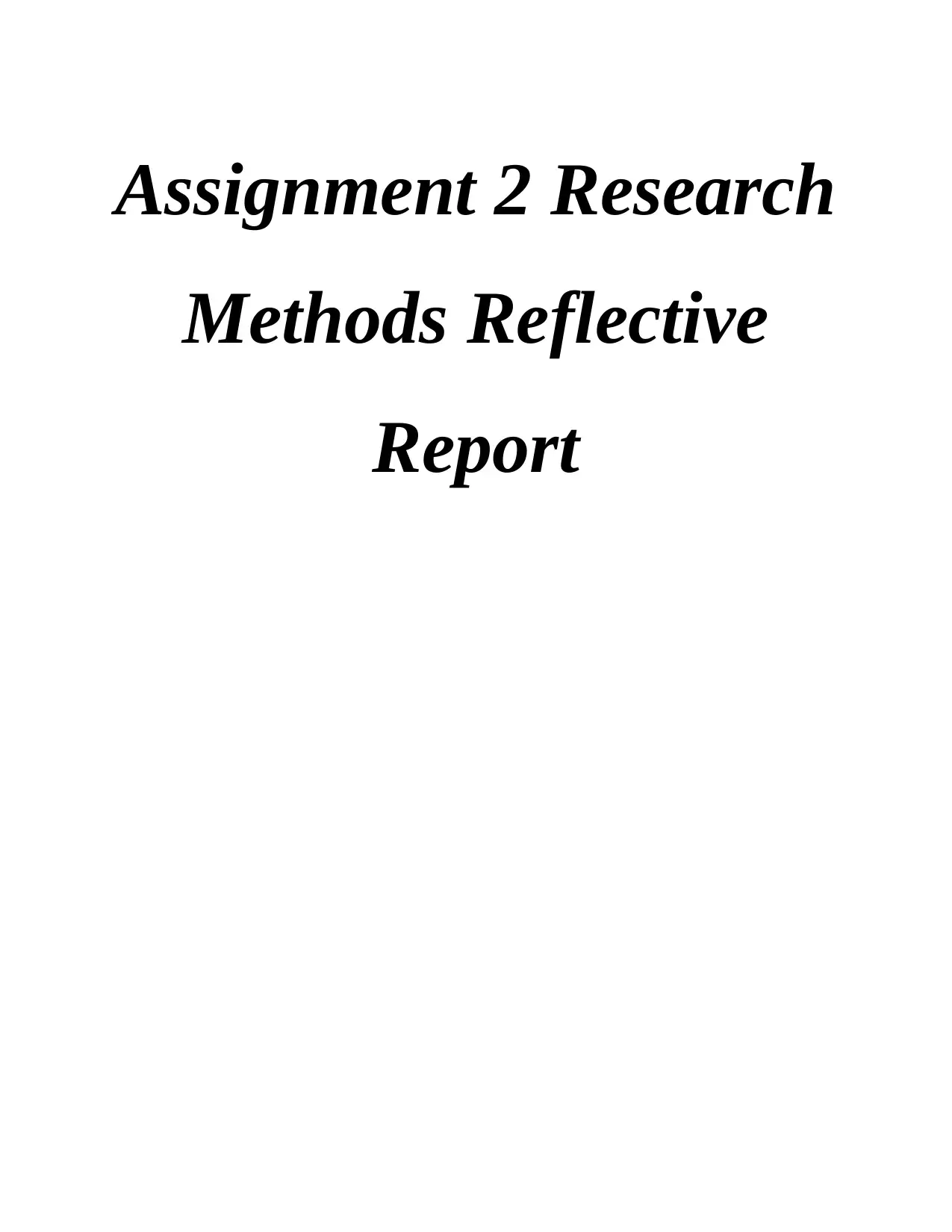
Assignment 2 Research
Methods Reflective
Report
Methods Reflective
Report
Paraphrase This Document
Need a fresh take? Get an instant paraphrase of this document with our AI Paraphraser
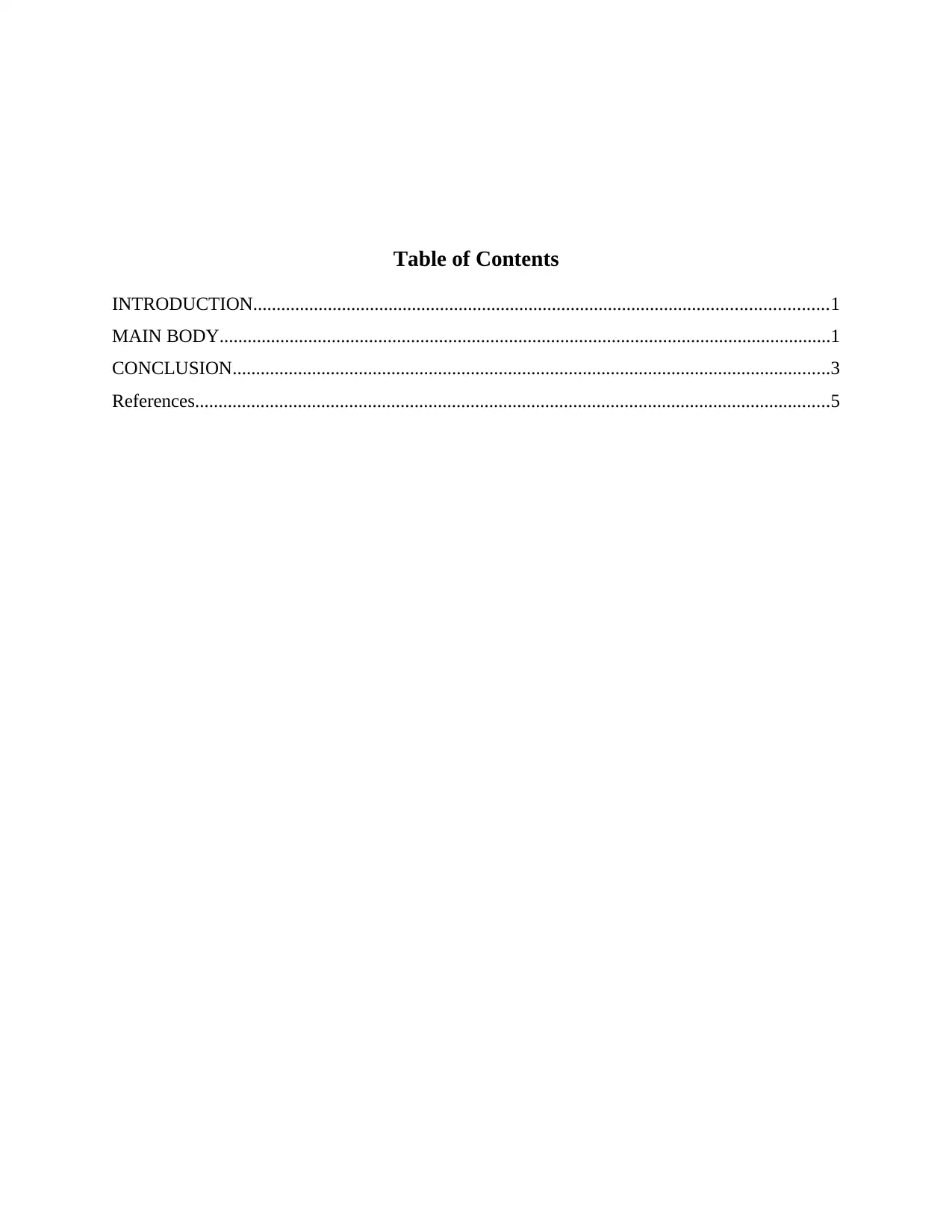
Table of Contents
INTRODUCTION...........................................................................................................................1
MAIN BODY...................................................................................................................................1
CONCLUSION................................................................................................................................3
References........................................................................................................................................5
INTRODUCTION...........................................................................................................................1
MAIN BODY...................................................................................................................................1
CONCLUSION................................................................................................................................3
References........................................................................................................................................5
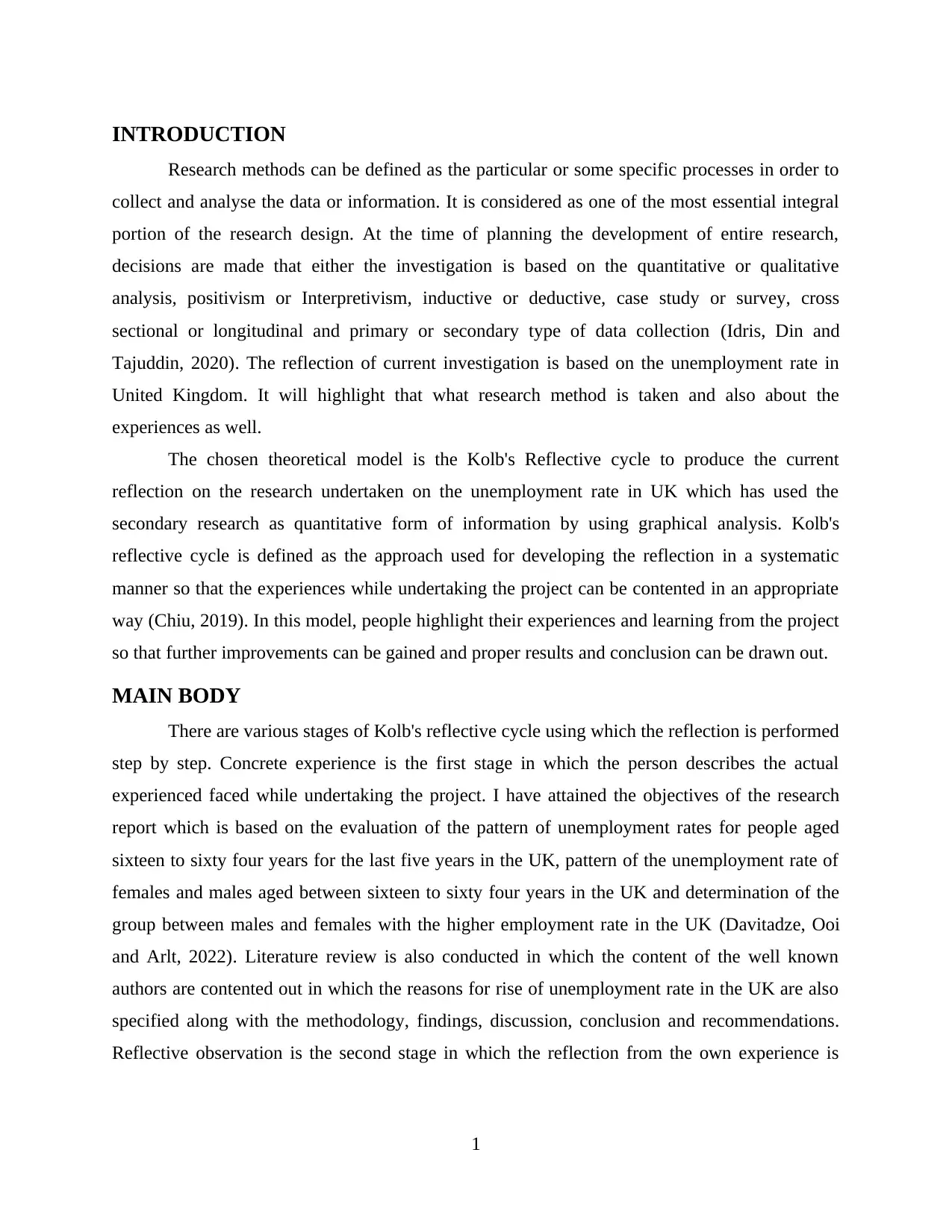
INTRODUCTION
Research methods can be defined as the particular or some specific processes in order to
collect and analyse the data or information. It is considered as one of the most essential integral
portion of the research design. At the time of planning the development of entire research,
decisions are made that either the investigation is based on the quantitative or qualitative
analysis, positivism or Interpretivism, inductive or deductive, case study or survey, cross
sectional or longitudinal and primary or secondary type of data collection (Idris, Din and
Tajuddin, 2020). The reflection of current investigation is based on the unemployment rate in
United Kingdom. It will highlight that what research method is taken and also about the
experiences as well.
The chosen theoretical model is the Kolb's Reflective cycle to produce the current
reflection on the research undertaken on the unemployment rate in UK which has used the
secondary research as quantitative form of information by using graphical analysis. Kolb's
reflective cycle is defined as the approach used for developing the reflection in a systematic
manner so that the experiences while undertaking the project can be contented in an appropriate
way (Chiu, 2019). In this model, people highlight their experiences and learning from the project
so that further improvements can be gained and proper results and conclusion can be drawn out.
MAIN BODY
There are various stages of Kolb's reflective cycle using which the reflection is performed
step by step. Concrete experience is the first stage in which the person describes the actual
experienced faced while undertaking the project. I have attained the objectives of the research
report which is based on the evaluation of the pattern of unemployment rates for people aged
sixteen to sixty four years for the last five years in the UK, pattern of the unemployment rate of
females and males aged between sixteen to sixty four years in the UK and determination of the
group between males and females with the higher employment rate in the UK (Davitadze, Ooi
and Arlt, 2022). Literature review is also conducted in which the content of the well known
authors are contented out in which the reasons for rise of unemployment rate in the UK are also
specified along with the methodology, findings, discussion, conclusion and recommendations.
Reflective observation is the second stage in which the reflection from the own experience is
1
Research methods can be defined as the particular or some specific processes in order to
collect and analyse the data or information. It is considered as one of the most essential integral
portion of the research design. At the time of planning the development of entire research,
decisions are made that either the investigation is based on the quantitative or qualitative
analysis, positivism or Interpretivism, inductive or deductive, case study or survey, cross
sectional or longitudinal and primary or secondary type of data collection (Idris, Din and
Tajuddin, 2020). The reflection of current investigation is based on the unemployment rate in
United Kingdom. It will highlight that what research method is taken and also about the
experiences as well.
The chosen theoretical model is the Kolb's Reflective cycle to produce the current
reflection on the research undertaken on the unemployment rate in UK which has used the
secondary research as quantitative form of information by using graphical analysis. Kolb's
reflective cycle is defined as the approach used for developing the reflection in a systematic
manner so that the experiences while undertaking the project can be contented in an appropriate
way (Chiu, 2019). In this model, people highlight their experiences and learning from the project
so that further improvements can be gained and proper results and conclusion can be drawn out.
MAIN BODY
There are various stages of Kolb's reflective cycle using which the reflection is performed
step by step. Concrete experience is the first stage in which the person describes the actual
experienced faced while undertaking the project. I have attained the objectives of the research
report which is based on the evaluation of the pattern of unemployment rates for people aged
sixteen to sixty four years for the last five years in the UK, pattern of the unemployment rate of
females and males aged between sixteen to sixty four years in the UK and determination of the
group between males and females with the higher employment rate in the UK (Davitadze, Ooi
and Arlt, 2022). Literature review is also conducted in which the content of the well known
authors are contented out in which the reasons for rise of unemployment rate in the UK are also
specified along with the methodology, findings, discussion, conclusion and recommendations.
Reflective observation is the second stage in which the reflection from the own experience is
1
⊘ This is a preview!⊘
Do you want full access?
Subscribe today to unlock all pages.

Trusted by 1+ million students worldwide
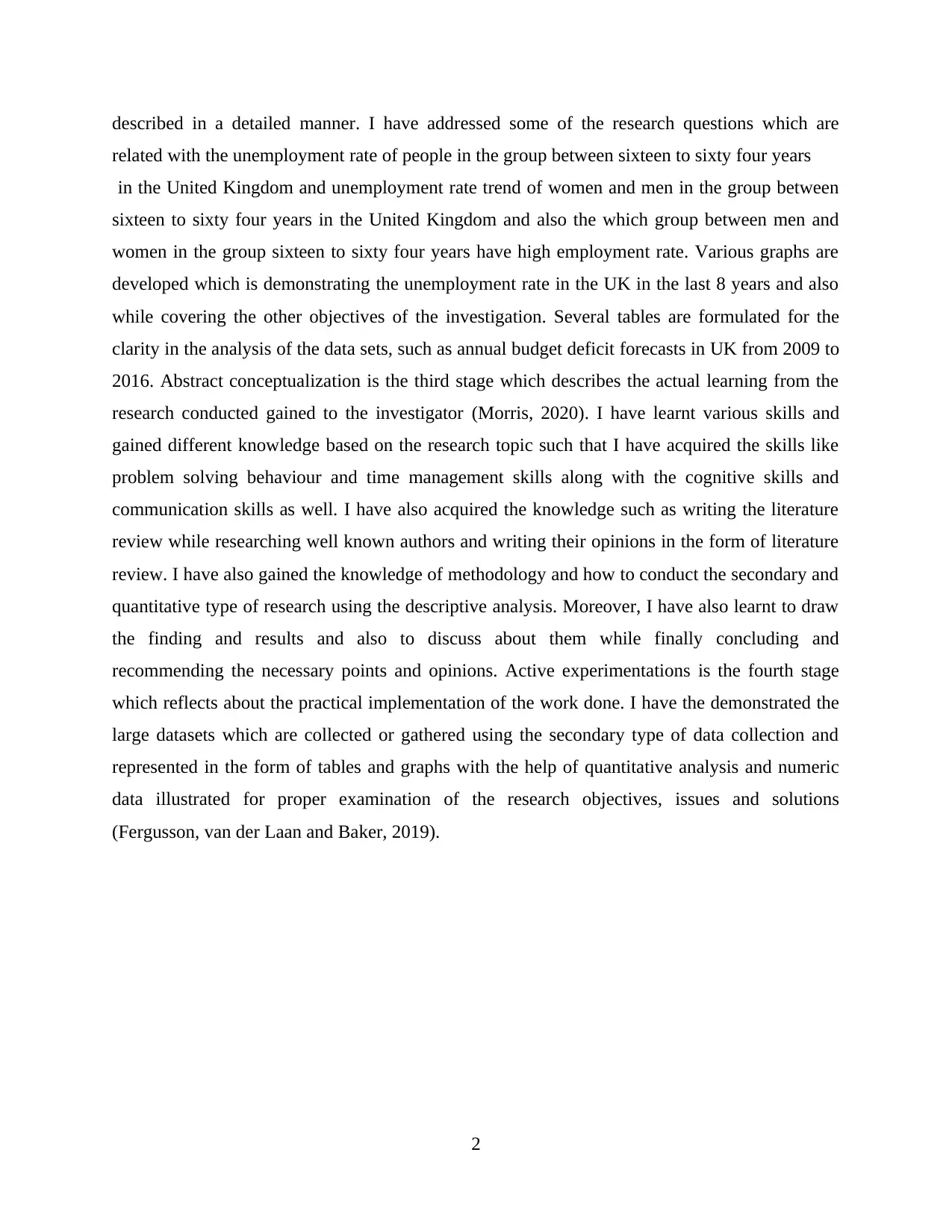
described in a detailed manner. I have addressed some of the research questions which are
related with the unemployment rate of people in the group between sixteen to sixty four years
in the United Kingdom and unemployment rate trend of women and men in the group between
sixteen to sixty four years in the United Kingdom and also the which group between men and
women in the group sixteen to sixty four years have high employment rate. Various graphs are
developed which is demonstrating the unemployment rate in the UK in the last 8 years and also
while covering the other objectives of the investigation. Several tables are formulated for the
clarity in the analysis of the data sets, such as annual budget deficit forecasts in UK from 2009 to
2016. Abstract conceptualization is the third stage which describes the actual learning from the
research conducted gained to the investigator (Morris, 2020). I have learnt various skills and
gained different knowledge based on the research topic such that I have acquired the skills like
problem solving behaviour and time management skills along with the cognitive skills and
communication skills as well. I have also acquired the knowledge such as writing the literature
review while researching well known authors and writing their opinions in the form of literature
review. I have also gained the knowledge of methodology and how to conduct the secondary and
quantitative type of research using the descriptive analysis. Moreover, I have also learnt to draw
the finding and results and also to discuss about them while finally concluding and
recommending the necessary points and opinions. Active experimentations is the fourth stage
which reflects about the practical implementation of the work done. I have the demonstrated the
large datasets which are collected or gathered using the secondary type of data collection and
represented in the form of tables and graphs with the help of quantitative analysis and numeric
data illustrated for proper examination of the research objectives, issues and solutions
(Fergusson, van der Laan and Baker, 2019).
2
related with the unemployment rate of people in the group between sixteen to sixty four years
in the United Kingdom and unemployment rate trend of women and men in the group between
sixteen to sixty four years in the United Kingdom and also the which group between men and
women in the group sixteen to sixty four years have high employment rate. Various graphs are
developed which is demonstrating the unemployment rate in the UK in the last 8 years and also
while covering the other objectives of the investigation. Several tables are formulated for the
clarity in the analysis of the data sets, such as annual budget deficit forecasts in UK from 2009 to
2016. Abstract conceptualization is the third stage which describes the actual learning from the
research conducted gained to the investigator (Morris, 2020). I have learnt various skills and
gained different knowledge based on the research topic such that I have acquired the skills like
problem solving behaviour and time management skills along with the cognitive skills and
communication skills as well. I have also acquired the knowledge such as writing the literature
review while researching well known authors and writing their opinions in the form of literature
review. I have also gained the knowledge of methodology and how to conduct the secondary and
quantitative type of research using the descriptive analysis. Moreover, I have also learnt to draw
the finding and results and also to discuss about them while finally concluding and
recommending the necessary points and opinions. Active experimentations is the fourth stage
which reflects about the practical implementation of the work done. I have the demonstrated the
large datasets which are collected or gathered using the secondary type of data collection and
represented in the form of tables and graphs with the help of quantitative analysis and numeric
data illustrated for proper examination of the research objectives, issues and solutions
(Fergusson, van der Laan and Baker, 2019).
2
Paraphrase This Document
Need a fresh take? Get an instant paraphrase of this document with our AI Paraphraser
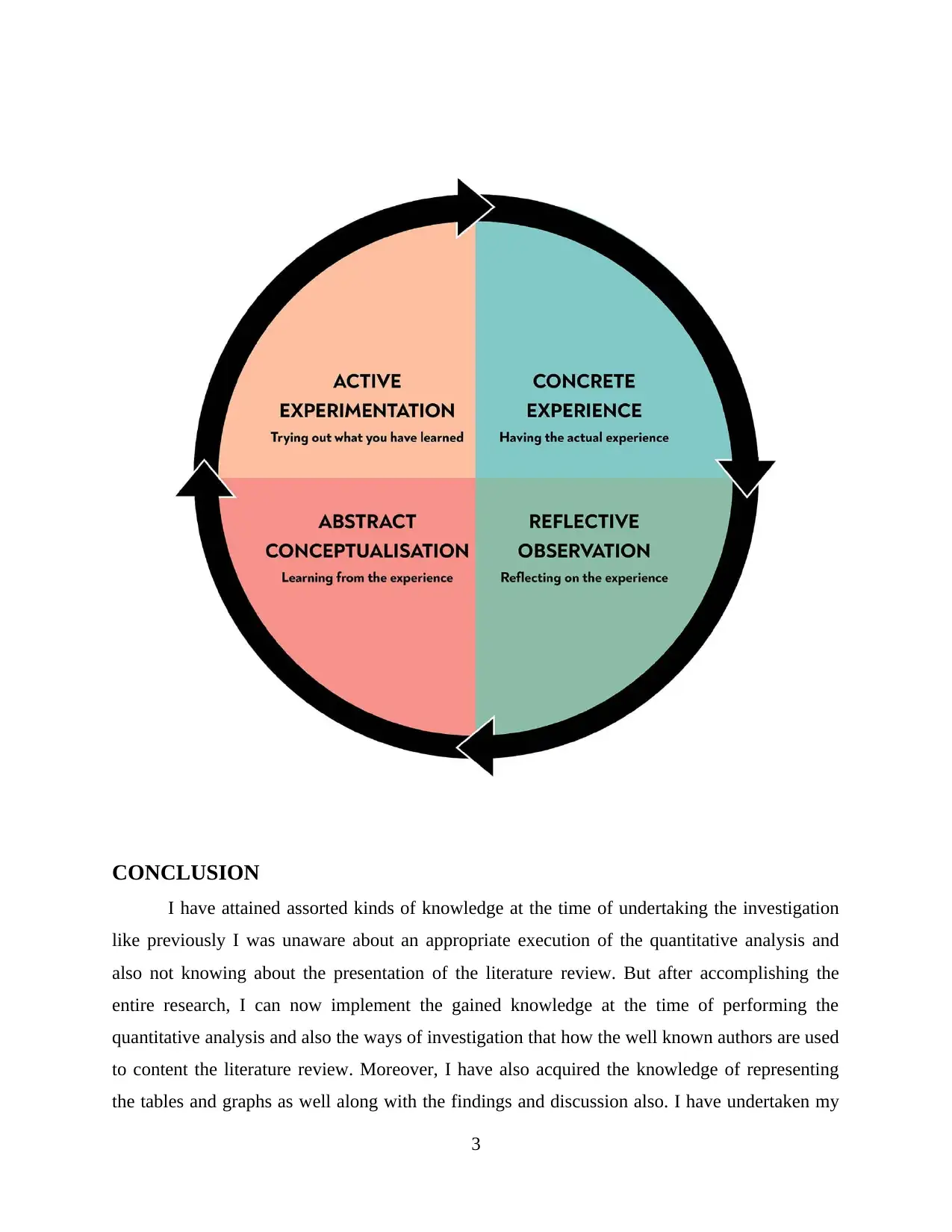
CONCLUSION
I have attained assorted kinds of knowledge at the time of undertaking the investigation
like previously I was unaware about an appropriate execution of the quantitative analysis and
also not knowing about the presentation of the literature review. But after accomplishing the
entire research, I can now implement the gained knowledge at the time of performing the
quantitative analysis and also the ways of investigation that how the well known authors are used
to content the literature review. Moreover, I have also acquired the knowledge of representing
the tables and graphs as well along with the findings and discussion also. I have undertaken my
3
I have attained assorted kinds of knowledge at the time of undertaking the investigation
like previously I was unaware about an appropriate execution of the quantitative analysis and
also not knowing about the presentation of the literature review. But after accomplishing the
entire research, I can now implement the gained knowledge at the time of performing the
quantitative analysis and also the ways of investigation that how the well known authors are used
to content the literature review. Moreover, I have also acquired the knowledge of representing
the tables and graphs as well along with the findings and discussion also. I have undertaken my
3
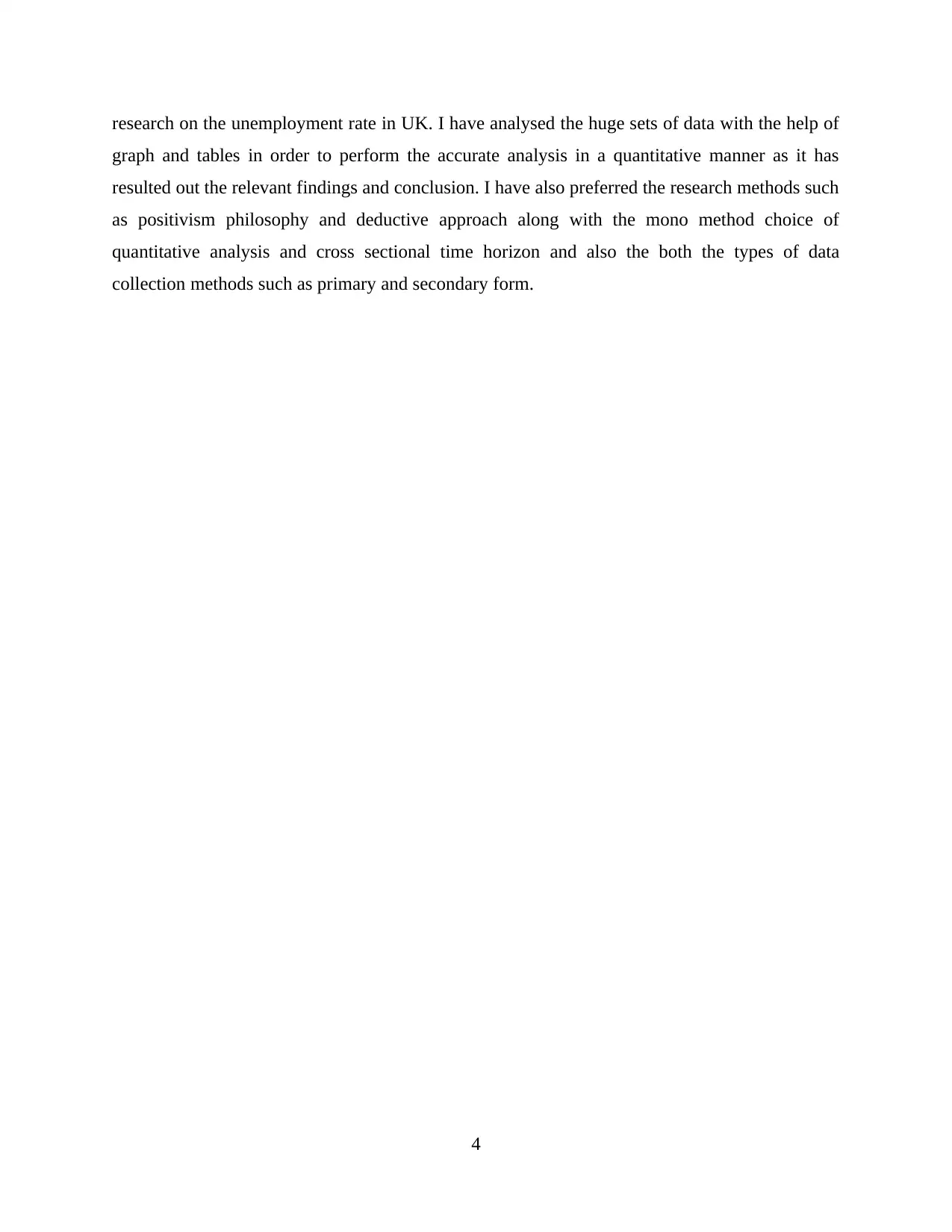
research on the unemployment rate in UK. I have analysed the huge sets of data with the help of
graph and tables in order to perform the accurate analysis in a quantitative manner as it has
resulted out the relevant findings and conclusion. I have also preferred the research methods such
as positivism philosophy and deductive approach along with the mono method choice of
quantitative analysis and cross sectional time horizon and also the both the types of data
collection methods such as primary and secondary form.
4
graph and tables in order to perform the accurate analysis in a quantitative manner as it has
resulted out the relevant findings and conclusion. I have also preferred the research methods such
as positivism philosophy and deductive approach along with the mono method choice of
quantitative analysis and cross sectional time horizon and also the both the types of data
collection methods such as primary and secondary form.
4
⊘ This is a preview!⊘
Do you want full access?
Subscribe today to unlock all pages.

Trusted by 1+ million students worldwide
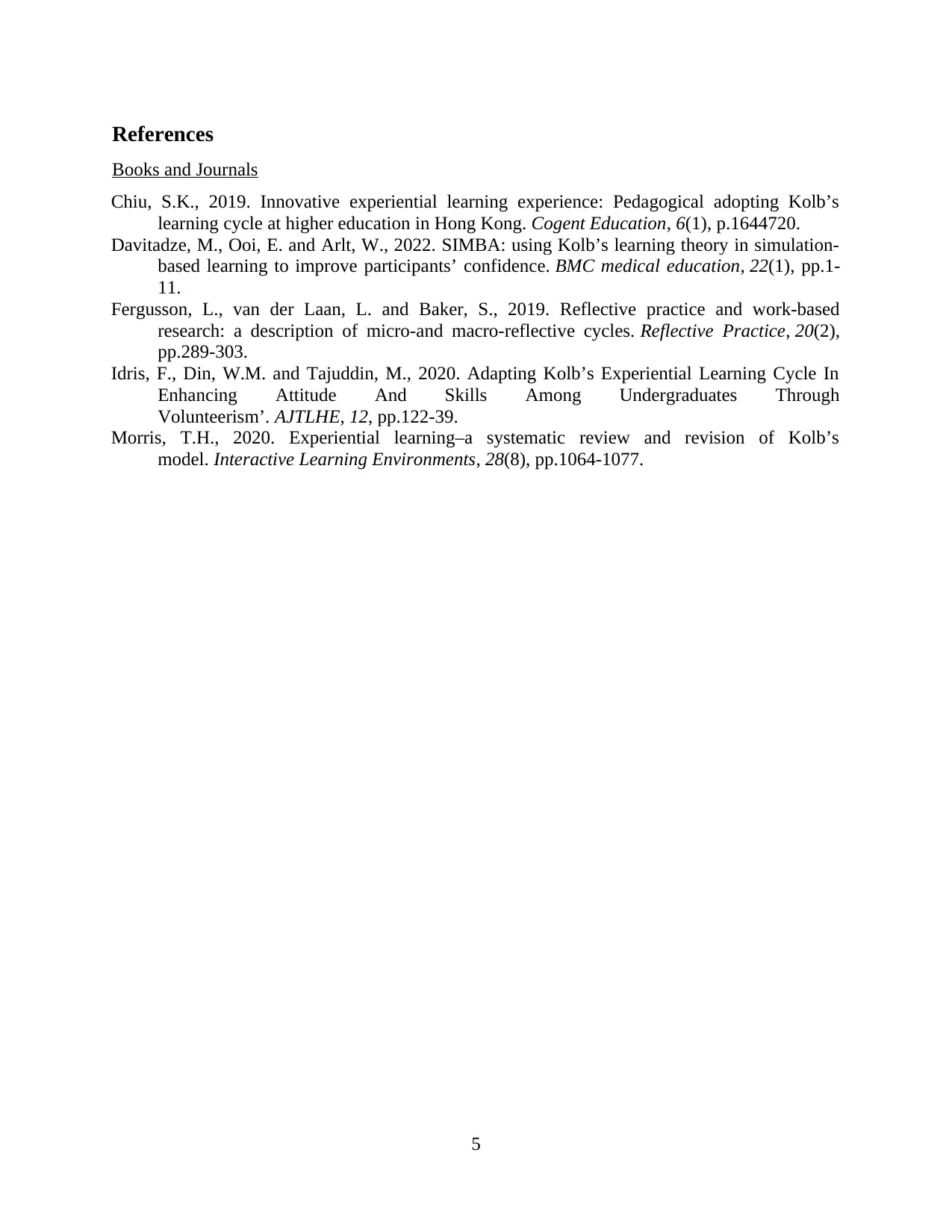
References
Books and Journals
Chiu, S.K., 2019. Innovative experiential learning experience: Pedagogical adopting Kolb’s
learning cycle at higher education in Hong Kong. Cogent Education, 6(1), p.1644720.
Davitadze, M., Ooi, E. and Arlt, W., 2022. SIMBA: using Kolb’s learning theory in simulation-
based learning to improve participants’ confidence. BMC medical education, 22(1), pp.1-
11.
Fergusson, L., van der Laan, L. and Baker, S., 2019. Reflective practice and work-based
research: a description of micro-and macro-reflective cycles. Reflective Practice, 20(2),
pp.289-303.
Idris, F., Din, W.M. and Tajuddin, M., 2020. Adapting Kolb’s Experiential Learning Cycle In
Enhancing Attitude And Skills Among Undergraduates Through
Volunteerism’. AJTLHE, 12, pp.122-39.
Morris, T.H., 2020. Experiential learning–a systematic review and revision of Kolb’s
model. Interactive Learning Environments, 28(8), pp.1064-1077.
5
Books and Journals
Chiu, S.K., 2019. Innovative experiential learning experience: Pedagogical adopting Kolb’s
learning cycle at higher education in Hong Kong. Cogent Education, 6(1), p.1644720.
Davitadze, M., Ooi, E. and Arlt, W., 2022. SIMBA: using Kolb’s learning theory in simulation-
based learning to improve participants’ confidence. BMC medical education, 22(1), pp.1-
11.
Fergusson, L., van der Laan, L. and Baker, S., 2019. Reflective practice and work-based
research: a description of micro-and macro-reflective cycles. Reflective Practice, 20(2),
pp.289-303.
Idris, F., Din, W.M. and Tajuddin, M., 2020. Adapting Kolb’s Experiential Learning Cycle In
Enhancing Attitude And Skills Among Undergraduates Through
Volunteerism’. AJTLHE, 12, pp.122-39.
Morris, T.H., 2020. Experiential learning–a systematic review and revision of Kolb’s
model. Interactive Learning Environments, 28(8), pp.1064-1077.
5
1 out of 7
Related Documents
Your All-in-One AI-Powered Toolkit for Academic Success.
+13062052269
info@desklib.com
Available 24*7 on WhatsApp / Email
![[object Object]](/_next/static/media/star-bottom.7253800d.svg)
Unlock your academic potential
Copyright © 2020–2026 A2Z Services. All Rights Reserved. Developed and managed by ZUCOL.



